初三上册期中英语语法归纳
初三英语上册期中知识点归纳
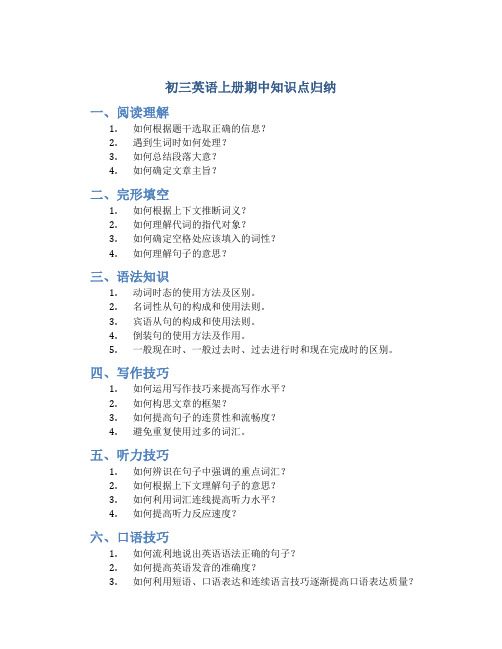
初三英语上册期中知识点归纳
一、阅读理解
1.如何根据题干选取正确的信息?
2.遇到生词时如何处理?
3.如何总结段落大意?
4.如何确定文章主旨?
二、完形填空
1.如何根据上下文推断词义?
2.如何理解代词的指代对象?
3.如何确定空格处应该填入的词性?
4.如何理解句子的意思?
三、语法知识
1.动词时态的使用方法及区别。
2.名词性从句的构成和使用法则。
3.宾语从句的构成和使用法则。
4.倒装句的使用方法及作用。
5.一般现在时、一般过去时、过去进行时和现在完成时的区别。
四、写作技巧
1.如何运用写作技巧来提高写作水平?
2.如何构思文章的框架?
3.如何提高句子的连贯性和流畅度?
4.避免重复使用过多的词汇。
五、听力技巧
1.如何辨识在句子中强调的重点词汇?
2.如何根据上下文理解句子的意思?
3.如何利用词汇连线提高听力水平?
4.如何提高听力反应速度?
六、口语技巧
1.如何流利地说出英语语法正确的句子?
2.如何提高英语发音的准确度?
3.如何利用短语、口语表达和连续语言技巧逐渐提高口语表达质量?
七、词汇积累
1.如何积累英语词汇?
2.如何区分英语近义词?
3.如何利用记忆方法巩固词汇?
4.如何将所学的词汇应用于写作和口语表达中?
以上为初三英语上册期中知识点归纳,通过对以上知识点的学习与应用,希望能够提高英语学习的效率和质量。
牛津译林版九年级英语上册期中复习重点

牛津译林版九年级英语上册期中复习重点9A期中复习1.pay attention to your pronunciation , pay attention to recycling to protect the environment2.take notice of him , I noticed him sleeping in class the other day.3.devote some time to sth. = spend some time on sth.He devoted himself to teaching = He was devoted to teaching.4.正反义词间的转换not patient = impatient , finish the work incorrectly5.believe in sb. = trust sb.6.名词单复数的转变:make a speech = make speeches7.there is nothing wrong with … = there isn’t anything wrong with…8.主动和被动间的转化do sth. = sth be done9.n. – adj. – adv. 间转换peace – peaceful – peacefullysadness – sad – sadlyhappiness – happy -- happily10.prefer to do sth. = would rather do sth.prefer doing to doing = would rather do than do11.cheer you up = make you feel happy12.make you remember sth. = remind you of sth.13.be of some help to you = be helpful to yoube of value = be valuable be important = be of importance14.make it easier to do sth. = do sth. more easilymake it easy to do sth. = do sth. easily15.make a decision/decisions = decide to do sth. = make up one’s mind to do sth.16.though/although A, B. = A, but B…because A…., B…. = A…., so B….because+句子=because of doing / sth.17.suggest that +句子, suggest doing ——advise sb. to do sth.many suggestions = much advice18.the cause of … = the reason for …19.work out the problem = solve the problem20.silence n. silent adj. Break the silence. There’s silence. It’s silent.21.worry n.[c] keep worries to oneselfworry v. ~ about sb. worried adj. be ~ about sb.22.improve … = make … better23.go over … = review …24.whene ver …. = every time …25.through sth. ------- by doing sth 区别though, thoughtthrough hard work = by working hard26.much + n. [u] = a great deal of …(加不可数名词:information, knowledge , courage)27.while/when/before/after +句子可转化为while/when/before/after+doing28.get sb. to do sth. = make/have/let sb. do sth.29.succeed in doing sth. = do sth. successfully [注意还有名词success,形容词successful] 区别victory30.achieve a lot = have many achievements31.body type doesn’t matter. = body type is not so important.32.Sb. did sth. after …. 可转换为sb. didn’t do sth. until …33.die = lose one’s life[lives] 名词: death the death of sb. dead adj. = not alive/ not living34.a writer from Germany = a German writer [German adj. 德国的] many Germans 许多德国人35.write down what he thinks = write down his thoughts the thought of winning the race36.give sb courage to do sth. = encourage sb. to do sth.37.feel surprised to do sth. = do sth. in surprise38.be full of … = be filled with… 充满39.in the centre of … = in the central part of …= in central …40.show an interest in doing sth. = be interested in doing sth.注意还有修饰物的形容词interesting41.not special = common42.over 50 sounds = more than 50 soundsunit 11.grammar n. 语法【U】pay more attention to English grammar a grammar bookbe patient enough to repeat grammar rules for us2.born adj. 天生的He was born to succeed in life. be born again(重生), a born poeta born and bred American (土生土长的)3.win high praise 赢得很高的赞扬praise n.[u] 称赞,赞扬His book received high praise from readers. V. We praised his courage.He was praised for his patience.4.give up doing sth. 放弃做某事5.general adj. 总的general manager 总经理( 区别:chief engineer) in general 总的来说6.race n. [c] 赛跑,竞赛win/lose a race She came first in the 100-meter race. A race against time 和时间的赛跑7.high-speed adj. 高速的8.miss n. [c] 错误,过失A miss is as good as a mile. V. miss a good chance missed buying the magazine(未能...)9.connect vt. 连接connect A to/with B 把A与B连接起来被动语态:be connected to sth. 被连接到...Build a railway connecting Tianjin to Tangshan.10.as good as ... =almost, nearly简直是adv.He is as good as dead.He is as good as my brother. 和...一样好对比as well as adv. 又,也=also, tooThey visited some factories, as well as hospitals.She can play basketball as well as football.She can play basketball as well as me.( 和...一样好)The book is interesting as well as educational.11.afford to do sth. 承担得起做某事afford sth. 承担得起某物We can’t afford to make any mistakes. we don't have enough money/time to do sth. = we can't afford the money/time to do sth.12.standard [拼写= stand + ard] n.[c] 标准works to high standardsHis work was below / not up to my standard. I set high standards for my students.13.pioneer n. [c] 先锋,开拓者14.careful adj. carefully adv. carefulness n. [u]careless adj. carelessly adv. carelessness n. [u]Carelessness will be a disaster not only to ourselves but also to patients.15.devote one's time/life/oneself to doing sth. /sth. 贡献于...Devote most of her time to her workHe devoted his life to educating (the education of ) teenagers.16.impatient adj. 不耐烦的be ~ with sb.17.think twice 三思18.all 三者或以上都---- none (三者或以上)一个都不both 两者都---- neither 两者都不either 两者中任意一者;也[用于否定句]19.both A and B 复数概念(both... and .... not 部分否定)not only ... but also ... 就近原则but also I have been there.either ... or ... 要么...要么... 就近原则neither...nor ... 既不...也不... 就近原则...nor I was late. 【*there be结构也有就近原则】20.calendar n. 日历21.appear --- disappear v22.lively adj. 活泼的;生机勃勃的,生动的区别live, lovely, alive(dead 反义词)A lively discussionThe music is bright and lively.It’s said that people born in the Year of the Horse are lively.23.divide vt. 划分[拼写] be divided into sth. 被划分成...24.shape vt. 塑造25.It is said that ... 据说26.believe in sb. = trust sb. 信任某人27.make a speech/speeches 【关注拼写,复数+es】28.absent adj. 缺席的be absent from29.practice n. v. practical adj. practi se v 从事,执业Put your plan into practicePractice speaking in front of othersPractice makes perfectPractical实际的,老练的advicePracticed adj. 对... 熟练的,有经验的30.say and speak 区别What did you say?I have nothing to say to you.It’s said that =It is said that...= They say that...In her letter she said that she had an accident.-He is a famous composer. -You don’t say. 真的?(表吃惊或讽刺)不会吧,不至于吧。
初中期中考试英语语法大全(总结篇)(1)

1 (see 、hear 、notice 、find 、feel 、listen to 、look at (感官动词)+do eg:I like watching monkeys jump2 (比较级and 比较级)表示越来越怎么样3 a piece of cake =easy 小菜一碟(容易)4 agree with sb 赞成某人5 all kinds of 各种各样a kind of 一样6 all over the world = the whole world 整个世界7 along with同……一道,伴随…… eg : I will go along with you我将和你一起去the students planted trees along with their teachers 学生同老师们一起种树8 As soon as 一怎么样就怎么样9 as you can see 你是知道的10 ask for ……求助向…要…(直接接想要的东西)eg : ask you for my book11 ask sb for sth 向某人什么12 ask sb to do sth 询问某人某事ask sb not to do 叫某人不要做某事13 at the age of 在……岁时eg:I am sixteen I am at the age of sixteen14 at the beginning of …… ……的起初;……的开始15 at the end of +地点/+时间最后;尽头;末尾eg : At the end of the day16 at this time of year 在每年的这个时候17 be /feel confident of sth /that clause +从句感觉/对什么有信心,自信eg : I am / feel confident of my spoken English I feel that I can pass the test18 be + doing 表:1 现在进行时2 将来时19 be able to (+ v 原) = can (+ v 原)能够…… eg : She is able to sing She can sing20 be able to do sth 能够干什么eg :she is able to sing21 be afraid to do (of sth 恐惧,害怕…… eg : I'm afraed to go out at night I'm afraid of dog 22 be allowed to do 被允许做什么eg: I'm allowed to watch TV 我被允许看电视I should be allowed to watch TV 我应该被允许看电视23 be angry with sb 生某人的气eg : Don't be angry with me24 be angry with(at) sb for doing sth 为什么而生某人的气25 be as…原级…as 和什么一样eg : She is as tall as me 她和我一样高26 be ashamed to27 be away from 远离28 be away from 从……离开29 be bad for 对什么有害eg : Reading books in the sun is bad for your eyes 在太阳下看书对你的眼睛不好30 be born 出生于31 be busy doing sth 忙于做什么事be busy with sth 忙于……32 be careful 当心;小心33 be different from…… 和什么不一样34 be famous for 以……著名35 be friendly to sb 对某人友好36 be from = come from 来自eg :He is from Bejing He comes from Bejing Is he from Bejing ? Does he come from Bejing ?37 be full of 装满……的be filled with 充满eg: the glass is full of water the glass is filled with water38 be glad+to+do/从句39 be going to + v(原)将来时40 be good at(+doing) = do well in 在某方面善长, 善于……41 be good for 对什么有好处eg : Reading aloud is good for your English42 be happy to do 很高兴做某事43 be helpful to sb 对某人有好处eg : Reading aloud is helpful to you 大声朗读对你有好处Exercising is helpful to your bady 锻炼对你的身体有好处44 be in good health 身体健康45 be in trouble 处于困难中eg : She is in trouble They are in tronble46 be interested in 对某方面感兴趣47 be late for = come late to 迟到eg: Be late for class 上课迟到48 be like 像…… eg : I'm like my mother49 be mad at 生某人的气50 be made from 由……制成(制成以后看不见原材料)51 be made of 由……制成(制成以后还看得见原材料) 52 be not sure 表不确定53 be on a visit to 参观54 be popular with sb 受某人欢迎55 be quiet 安静56 be short for 表**的缩写eg: 陶is short for 陶俊杰57 be sick in bed 生病在床58 be sorry to do sth be sorry for sb eg : I am sorry for you59 be sorry to hear that 60 be sorry to trouble sb eg : I am sorry to trouble you61 be strict in doing sth 严于做某事eg : He's strict in obeying noles62 be strict with sb 对某人要求严格eg: Some students are not strict with them selves 这些学生对自己不严格63 be strict with sb in sth 某方面对某人严格64 be supposed to do 被要求干什么65 be sure 表确定66 be sure of doing sth 对做某事有信心eg: He is sure of winning I am sure of learning English well67 be sure of sth 对做某事有信心eg: I'm sure of my head (my teacher 我相信我的大脑(老师)68 be sure that sth 对做某事有信心eg: I'm suer that he can pass the test 我相信他能通过考试69 be sure to do sth一定会做某事eg: We are sure to pass the test 我们一定会通过这次考试We are sure to learn English well 我们一定能学好英语70 be terrified of + 名/动doing 害怕……71 be terrified to do sth 害怕做某事72 be the same as … 和什么一样73 be used to doing sth 习惯做某事eg: My father is used to getting up early 我爸爸习惯早He is used to sleeping in class 他习惯上课睡觉74 be worth doing 值得做什么75 be(feel) afraid to do sth 害怕做某事be afraid of sth 害怕某物be afraid that 丛句76 because+句子because of +短语eg : He was late because he had a headache He was late because of his headache77 begin to do = start to do 开始做某事start…with…=begin…with… 以什么开始什么eg : Let's begin the game with the song I begin to go home78 between…and… 两者之间79 borrow sth from sb 向……借…… lend sth to sb ( lend sb sth 借给……什么东西eg : I borrowed a pen from him he lent a pen to me ( he lent me a pen80 both = the same(as) = not different(from) 表相同81 bother 打扰bother sb to do stheg : I'm sorry to bother you ,but can you tell me to way to the station我十分道歉打扰你,但是你能告诉我怎么去车站the problem has been bothering me for weeks 这个问题困扰了我几个周了He's bothering me to lend him money82 by the end of 到……为止83 call sb sth eg : We call him old wang84 care 关心eg : Don't you care about this country's future ?你为什么不关心国家的未来85 catch up with sb 赶上某人86 chat with sb 和某人闲谈take sb to + 地点带某人去某地87 come in 进88 come over to 过来89 come up with 提出eg: Can you come up with a good idea 你能想出一个好办法吗?90 communicate with sb 和某人交流91 consider + doing 考虑做什么eg : Why not consider going to lu zhou 为什么不考虑去泸州?92 dance to 随着……跳舞eg : She likes dancing to the music 她喜欢随着音乐跳舞93 decide to do sth 决定做某事94 do a survey of 做某方面的调查95 do better in 在……方面做得更好96 do wrong 做错97 Don't forget to do sth 不要忘了做某事98 Don't mind +doing /从句/名词不要介意……99 each +名(单)每一个…eg : Each student has many books 每一个学生都有一些书100 end up +doing101 enjoy +doing喜欢102 escape from 从……逃跑eg: The prisoners have escaped from the prison犯人从监狱里逃跑出来103 expect to do sth 期待做某事104 fall down 摔下来fall off 从哪摔下来105 fall in love with sb /sth 爱上什么106 far from 离某地远eg : The school is far from my home107 find +it +adj +to do 发现做某事怎么样108 find sb/sth +adj 发现什么怎么样eg : I find the book interesting109 finish 完成+doing(名词)110 fit to sb = be fit for sb 适合某人111 forget to do 没有做而忘了forget doing 做了而又忘了eg: Don't forget to go home I forget closing door112 from…to… 从某某到某某eg: From me for her113 get /have sth down 做完,被(别人)做…eg: I have my hair cut 我理了发(头发被剪了)Tom got his bad tooth pulled out 汤母把他的坏牙拔掉了(被牙医拔掉了)114 get a part-time job= find a part-time job115 get along well with sb = get on well with sb 与某人相处得好116 get along with sb = get on with sb 与某人相处117 get ready for = be ready for为什么而准备eg : I get ready for math I am ready for math 118 get sb in to trouble 给某人麻119 get sb to do sth120 get…from… 从某处得到某物121 give a talk 做报告eg: He is give a tall122 give sth to sb give sb sth 给某人某物123 go fish 钓鱼go swimming 游泳124 go on to do 去做下一件事go on doing 继续做这件事125 go out away from go out of126 go to school 上学(用于专业的)go to the school 去学校(不一定是上学)127 good way to 好方法128 hate to do 讨厌没做过的事hate doing 讨厌做过的事129 have a party for sb 举办谁的晚会130 have a talk 听报告谈一谈131 have been doing 现在完成进行时eg : You have been talking You have been sleeping since 132 h ave been to …( 地方)……去过某过地方have gone to …(地方)去了某地还没回来133 have fun +doing 玩得高兴134 have sth to do 有什么事要做eg: I have a lot of homework to do 我有很多家庭作业要做I have nothing to do 我没什么事情做135 have to do sth 必须做某事136 have trouble (problem) (in) doing sth 做什么事情有麻烦137 have…time +doing138 have…(时间)…off 放……假eg: I have month off 我请一个月得假139 hear sb +do/doing 听见某人做某事/正在做某事140 help a lot 很大用处141 help sb with sth \one's sth 帮助某人某事(某方面)help sb (to) do sth 帮助某人做某事142 hope to do sth 希望做某事143 How about(+doing) = What about(+doing)144 how do you like = what do you think of 你对什么的看法145 if : 是否=wethereg: I don't know if (wether) I should go to the party 我不知道我是否应该去参加晚会He don't know if (wether) we will arrive on time tomorrow morning 他不知道我们明天早上是否能准时到达146 if :如果,假如(全部接一般时态)+条件语态从句eg: I'll go to LuZhou if it does't rain 假如明天不下雨,我就去泸州If they change the plan they will let me know 假如他们要改变计划,他们会让我知道的I'll go to England ,if I have enough money next year 如果我明年由足够的钱,我就要去英国147 in one's opinion = sb think 某人认为148 in some ways 在某些方面149 in the end = finally(adv) 最后150 in the north of… 什么在什么的北方(north 北sowth 南west 西east 东)151 in the sun 在太阳下152 increase 增加eg : They've increased the prece of petrol by 3% 他们把石油价增加了3%the population has increased from 12 million ten years ago to 18 million now153 instead of +(名)代替eg: I'd like an apple instead of a pear 我想要苹果,而不要梨子I like English instead of math 我喜欢英语而不喜欢数学154 introduce sb to sb 介绍某人给某人introduce oneself 自我介绍155 invite sb to do sth 邀请某人做某事156 It takes sb sometime to do sth 做某人花掉某人多少时间eg : It took me 5 minutes to do my homework It takes me half an hour to cook157 It's +adj +for sb to do sth 对某人来说做某事怎么样158 It's +adj +to do 做某事怎么样159 It's +adj for sb 对于某人来说怎么样It's +adj of sb 对某人来说太怎么样160 It's +adj(for sb) to do(对某人来说)做某事怎么样It's +adj of sb to do sth 对某人来说做某事太怎么样eg : It's nice of you to help me with my English161 It's a good idea for sb to do sth 对…… 来说是个好主意162 It's important to sb 对某人来说很重要eg: It's important to me163 It's time to do sth It's time for sth 到了该去做某事的时间eg : It's time to have class It's time for class 该去上课了164 join = take part in 参加165 just now 刚才166 keep +sb /sth +adj /介词短语让什么保持什么样?167 keep out 不让…… 进入168 keep sb adj 让……保持…… eg: I want to keep my m other happy keep healthy 保持健康169 key to +名词表示:某物的钥匙或某题的答案170 key to… anser to … key 可以是答题或钥匙171 laugh at… 取笑…… eg : Don't langh at others We langhed at the joke172 learn by oneslfe 自学173 learn from sb 向某人学习eg: We should learn from Lei Feng174 learn to do sth 学做某事175 let sb do sth 让某人做某事176 Let sb down 让某人失望eg :We shouldn't let our farents down 我们不应该让我们的父母失望177 live from :离某地远178 live in +大地方/at +小地方居住在某地eg: I live in LuZhou She lives at XuanTan179 look after = take care of 照顾照看180 lose one's way 谁迷路eg : Lose your way 你迷路181 make a decision to do sth 决定做某事182 make friends with sb 和谁成为朋友eg : I want to make friends with you183 make it early 把时间定的早一点184 make on exhibition of oneself 让某人出洋相185 make sb /n +n 使什么成为什么eg : I made her my step moller I made you my wife186 make sb /sth +adj 使某人(某物)怎么样eg : You must made your bed clean187 make sb /sth adj 使某人/某物怎么样188 make sb do sth 让某人做某事eg : I made him write 我以前让他写189 make up be made up of (被动语态)由……组成190 make…difference to…191 mind sb to do mind one's doing 介意……做什么192 most +名most of +代193 much too +形容词194 must be 一定195 need +名词196 need sb do sth 需要某人做某事197 need to do (实义动词)need do (情态动词)198 no /neithr of hate to do no /neithr of hate doing199 no +名词200 not anymore = no more 再也不…… eg: He didn't cry any more He cried no more 他再也不哭201 not… (形、副)at all eg: He's not tall at all she doesn't junp far at all202 not…at all 一点都不203 not…either 表否定,也不eg : I don't japanse either I don't have sister, either 我也没有姐姐204 not…until 直到……才……eg: I didn't sleep until my mother came back The child didn't stop crying until I give her sugar205 offer / provide sb with sth 给某人提供206 offer sb sth ( offer sth to sb 提供什么东西给某人eg : I offer you water (I offer water to you 我给你提供水207 on one's way to… 在谁去那的路上208 on the one hand 一方面on the other hand 另一方面209 on the phone = over the phone 用电话交谈210 on time 准时in time 及时211 one day =some day =someday 一天,有一天212 one of +可数名词的复数形式213 one to another 一个到另一个214 over and over agin 一遍又一遍的eg : He cleaned the floor over and over agin215 part-time job 兼职工作fall-time job 全职工作216 pay for… 付……钱pay the bill 开钱,付钱217 please +do218 please help yourself219 pleased with sb220 pool into = pore into221 practice +doing 练习做某事222 prefer sth to sth 相对……更喜欢…… eg : I prefer physics to chemisty 在物理和化学中,我更喜欢物理prefer doing to sth 更喜欢去做…不愿意去做… eg: He prefers riding a bike to diving 他更喜欢骑自行车,不开小车prefer to do sth rather than do sth 宁愿做…也不愿eg: My unde prefers to buy a now car rather than repaiv the used one 我叔叔更喜欢买新的车,也不去修旧车prefer sb not to do sth 更愿意… eg: I prefer her not to come 我不喜欢她不来223 pretend to do sth 装着去做什么pretend that 从句eg : The two cheats pretended to be working very hard 这两个骗子装着努力工作He pretended that he did not know the answer 他装着不知道答案224 rather…than 宁可……也不……eg : I would rather be a doctor than a teacher 我愿肯当医生,也不当老师He likes dogs rather than cats 他喜欢狗,不喜欢猫225 regard…as 把……当作……eg: Please give my best regards to your family 请带我向你的家人我最好的问候I regard you as my friend 我把你当作我的朋友He shows little regard for others 他不爱关心别人226 remid sb about sth 提醒某人什么事remid sb to do sth 提醒某人做某事eg : he remids me about cooking (he remids me to cook 他提醒我做饭227 remid sb of sth 使某人想起什么eg : the pictures remind me of my school days 这照片使我想起了我的学校the words that (which) the teacher talke to remind me of my mother228 return sth to sb 还什么东西给某人229 say to oneself 对自己说230 say to sb 对某人说231 sb spend somemoney on sth 花了多少钱在某事上232 sb spend sometime with sb 花了多少时间陪谁233 sb spend sometime(in) doing sth 花了多少时间做某事234 sb with sb +is sb and sb +are235 see sb do 看见某人做过某事see sb doing 看见某人正在做某事236 seem to do/be +adj 显得怎么样eg : You seem to be tired You seem to be happy237 send +sb sth 送给某人某物238 send…to…把什么寄到哪里去?239 shock 使……震惊eg : Oh , It's only you ! You give me a shock 啊,是你呀!吓我一跳240 show sb sth 向某人展示某物eg : I show her the book.241 show sb sth = show sth to sb 拿什么东西给某人看eg: Show me your pen Show your pen to me242 show sth to sb 向某人展示某物eg : I show the book to her.243 some…others… 一些……另一些……244 start…with… 从……开始begin…with… 从……开始245 stay away from 远离……eg : We're told to stay away from the animals whe visiting the zoo 当我们参观zoo 时,我们要远离动物If you want to lose weight you'd better stay auay from the sweet food 徒工你想减肥,你最好远离甜食246 stop doing 停下正在做的事247 stop sb from doing sth 阻止某人做某事248 stop sb(from) doing 阻止某人做某事249 stop to do 停下正在做的事去做下一件事250 such +名这样,这种251 suit sb 适合某人252 surprise sb 使某人惊奇to one's surprise 令某人惊奇253 take classes 上课254 take sb to 把某人带去eg : I take you to the hospital255 take walks = take a walk =go for a walk 散步256 ①talk to 对谁说eg : I talk to you ② talk with 和谁说eg : I talk with him③ talk of 谈到eg : we talked of you ④ talk about 谈论关于……257 talk with sb 和某人说话258 teach sb sth 教某人做某事259 tell sb do sth 告诉某人做某事260 tell sb sth tell sb that 丛句tell sb not to do sth tell a story261 tell sb sth 告诉某人某事262 tell sb to do sth 告诉某人做什么tell sb not to do sth 告诉某人不要做什么263 tell…from…264 thank you for +doing265 the same +名词(doing)+as……266 the same…(名)…as as…(adj adv)…as 相同267 the way to do sth =the way of doing st做某方面的方法the way to +地方去哪的路e g :Do you know the way to learn English Do you know the way of learning English268 the way to…(地点)到哪的269 too…to… 太怎样而不能……adj +enough to 足够…能… so…that +丛句eg: He is too young to go to school = He is so young that he can't go to schoolHe is old enough to go to school =He is so old that he can go to school270 transalte ……into…… 把什么翻译成什么eg : Trasalte English into chinese271 travel with sb和某人去旅游272 try one's best to do sth尽某人最大的努力去做某事eg: I will try my best to learn English well 273 try to do sth 想干什么,但没成功try doing sth 想干什么,已经做过了eg :He tried to climb 他想爬上去,但没成功He tried climbing 他想爬上去,已经做过了274 try…试衣服have a try 试一下275 turn down 开小←→ turn up 开大276 turn off 关上←→ turn on 打开open 拆开277 upside down 倒着278 visit to… 参观某个地方279 wait for sb 等某人280 wait for sb to do sth 等某人做什么wait for sb 等某人wait for sometime 等多少时间eg : Would you please wait for me to get ready 等我准备好,好吗?Let's wait for the rain to stop 让我们等雨停吧281 wake sb up 把某人叫醒282 want to do sth 想做某事283 watch sb do sth 观看某人做某事284 welcome to +…(地方)欢迎到……285 what about +n /doing eg : what about an apple286 what if 如果……怎么办What if +句子eg : What if it is true ? 如果是真的怎么办?What if aliens should come to the earth 假如外星人来到地球怎么办?287 what they will do = what to do288 What's the matter ? = What's the trouble ? = What's wrong ? 有什么困难?289 while +延续性动词290 why don't you do = why not do291 will you please do will you please not do292 with one's best = with the help of sb 在某人的帮助下293 with the help of sb 在某人的帮助下with one's help294 work at…在某处工作295 work with sb 和某人一起工作296 would like sth /to do sth eg : I would like to go to LuZhou297 would you please +do298 yet :至今,用在否定句中299 you'd better do 最好做某事= you'd better not do 最好不要做某事300 不定式+v(原)301 联系动词(taste吃起来/sound听起来/look看起来/semll闻起来)+adj302 名词、副词、形容词修饰enongh 时, 形容词放在之前,名词副词放在之后303 太多too much +不可数too many +可数much too 相当于very ,修饰形容词304 向宾语提问:Whom305 向地点提问:Where306 向方式提问:How307 向价格和不可数名词提问:How much308 向可数名词提问:How many309 向频率提问:How often310 向时间段提问:How long311 向时间提问:what time/when312 向物主代词提问:Whose313 向职业提问:what do/does……do314 向主语提问:Who315 在将来时中,……以后(用in,一般时态中,……以后(用after316.感官动词see, watch, observe, notice, look at, hear, listen to, smell, taste, feel + do表示动作的完整性,真实性;+doing 表示动作的连续性,进行性I saw him work in the garden yesterday.昨天我看见他在花园里干活了。
初中英语九年级上册全册各单元重点短语、句型、语法归纳

牛津译林版初中英语九年级上册全册各单元重点短语、句型、语法归纳九英上册期中复习Units1--4单元重点短语、句型、语法归纳Mr. Sun一、词汇大集合单词1.creative adj.有创造力的→create vt.创造→creator n.创造者2.energetic adj.精力充沛的→energy n.能量,能源3.organized adj.有条理的→-organize vt.组织→organization n.组织4.connect vt.连接→connection n.连接→connected adj.连接的,有关系的5.carelessness n.粗心→careless adj.粗心的→careful adj.细心的→care v.在乎6.devote v.奉献,贡献→devotion n.奉献,贡献→devoted adj.忠诚的,献身的7.impatient adj.没有耐心的→patient adj.有耐心的→patience n.耐心8.suitable adj.适合的→suit v.适合9.powerful adj.有力的,强大的→powerless adj.无力的,无能的→power n.能量,电力10.practical adj.实际的→practice v.&n.练习11.1ively adj.生动的,活泼的→live v.居住→live adj.直播的→alive adj.活着的词组1.keep…in order把……保持得井井有条2.show off炫耀3.get angry easily容易生气4.come up with new ideas想出新的主意5.be curious about对……好奇7.impress…with…以……给……留下印象8.win high praise from赢得……的高度评价9.take the lead处于领先地位10.fall behind落后11.take on.new challenges。
初三(九年级)英语语法大全
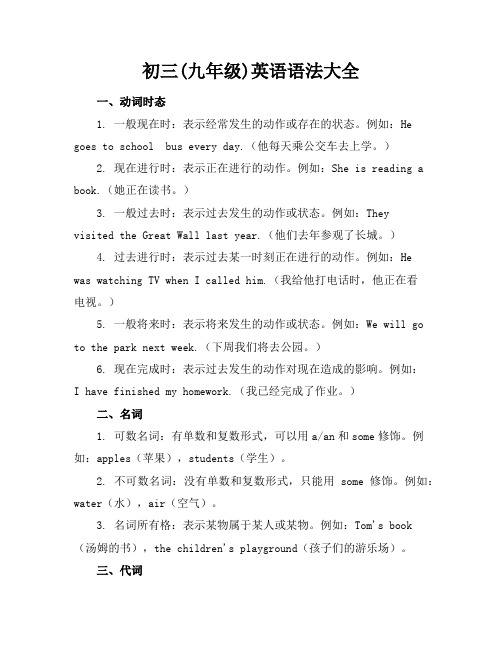
初三(九年级)英语语法大全一、动词时态1. 一般现在时:表示经常发生的动作或存在的状态。
例如:He goes to school bus every day.(他每天乘公交车去上学。
)2. 现在进行时:表示正在进行的动作。
例如:She is reading a book.(她正在读书。
)3. 一般过去时:表示过去发生的动作或状态。
例如:Theyvisited the Great Wall last year.(他们去年参观了长城。
)4. 过去进行时:表示过去某一时刻正在进行的动作。
例如:He was watching TV when I called him.(我给他打电话时,他正在看电视。
)5. 一般将来时:表示将来发生的动作或状态。
例如:We will go to the park next week.(下周我们将去公园。
)6. 现在完成时:表示过去发生的动作对现在造成的影响。
例如:I have finished my homework.(我已经完成了作业。
)二、名词1. 可数名词:有单数和复数形式,可以用a/an和some修饰。
例如:apples(苹果),students(学生)。
2. 不可数名词:没有单数和复数形式,只能用some修饰。
例如:water(水),air(空气)。
3. 名词所有格:表示某物属于某人或某物。
例如:Tom's book(汤姆的书),the children's playground(孩子们的游乐场)。
三、代词1. 人称代词:I(我),you(你/你们),he(他),she(她),it(它),we(我们),they(他们)。
2. 物主代词:my(我的),your(你的/你们的),his(他的),her(她的),its(它的),our(我们的),their(他们的)。
3. 指示代词:this(这个),that(那个),these(这些),those(那些)。
九年级英语上册期中知识点(最新)
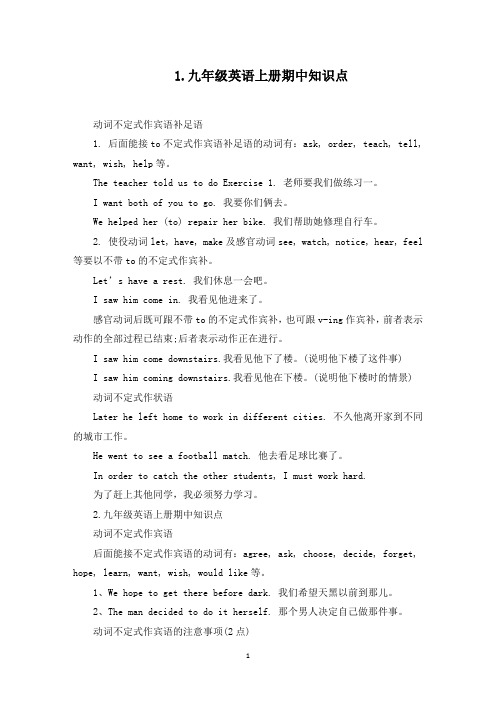
1.九年级英语上册期中知识点动词不定式作宾语补足语1. 后面能接to不定式作宾语补足语的动词有:ask, order, teach, tell, want, wish, help等。
The teacher told us to do Exercise 1. 老师要我们做练习一。
I want both of you to go. 我要你们俩去。
We helped her (to) repair her bike. 我们帮助她修理自行车。
2. 使役动词let, have, make及感官动词see, watch, notice, hear, feel 等要以不带to的不定式作宾补。
Let’s have a rest. 我们休息一会吧。
I saw him come in. 我看见他进来了。
感官动词后既可跟不带to的不定式作宾补,也可跟v-ing作宾补,前者表示动作的全部过程已结束;后者表示动作正在进行。
I saw him come downstairs.我看见他下了楼。
(说明他下楼了这件事)I saw him coming downstairs.我看见他在下楼。
(说明他下楼时的情景)动词不定式作状语Later he left home to work in different cities. 不久他离开家到不同的城市工作。
He went to see a football match. 他去看足球比赛了。
In order to catch the other students, I must work hard.为了赶上其他同学,我必须努力学习。
2.九年级英语上册期中知识点动词不定式作宾语后面能接不定式作宾语的动词有:agree, ask, choose, decide, forget, hope, learn, want, wish, would like等。
1、We hope to get there before dark. 我们希望天黑以前到那儿。
九年级英语期中必考知识点

I. Grammar(语法)1. Tenses (时态)- Present simple tense(现在简单时态)- Present continuous tense(现在进行时态)- Past simple tense(过去简单时态)- Past continuous tense(过去进行时态)- Future simple tense(将来简单时态)- Future continuous tense(将来进行时态)2. Modal verbs (情态动词)- Can / could(能够)- May / might(可能)- Shall / should(将要)- Will / would(将要)- Must(必须)- Have to / had to(不得不)- Need(需要)- Dare(敢)3. Conditionals (条件句)- Zero conditional (零条件句)- First conditional (一般条件句)- Second conditional (虚拟条件句)- Third conditional (过去完成虚拟条件句)4. Passive voice (被动语态)5. Reported speech (间接引语)7. Question forms and tags (疑问句和附加疑问句)II. Vocabulary(词汇)1. Synonyms and antonyms (同义词和反义词)2. Collocations (搭配)3. Homophones (同音词)4. Word families (词族)5. Idioms (习语)6. Prepositions (介词)7. Phrasal verbs (短语动词)1. Multiple choice questions (多项选择题)2. True or false questions (判断真假题)3. Matching questions (匹配题)4. Gap filling (填空题)5. Short answer questions (简答题)6. Summary writing (写作摘要)IV. Writing (写作)1. Narrative writing (叙事写作)2. Descriptive writing (描写性写作)3. Argumentative writing (议论性写作)4. Informal / formal letter writing (非正式/正式信件写作)5. Diary / Journal writing (日记写作)V. Listening(听力)1. Listening for main ideas (听取主要观点)2. Listening for specific information (听取特定信息)3. Listening for details (听取细节)5. Multiple choice questions (多项选择题)VI. Speaking(口语)1. Introduce yourself (介绍自己)2. Describing people and objects (描述人和物)3. Expressing opinions (表达意见)4. Giving directions (指示方向)5. Role play (角色扮演)以上是九年级英语期中必考的知识点。
九年级上册英语语法总结【八篇】
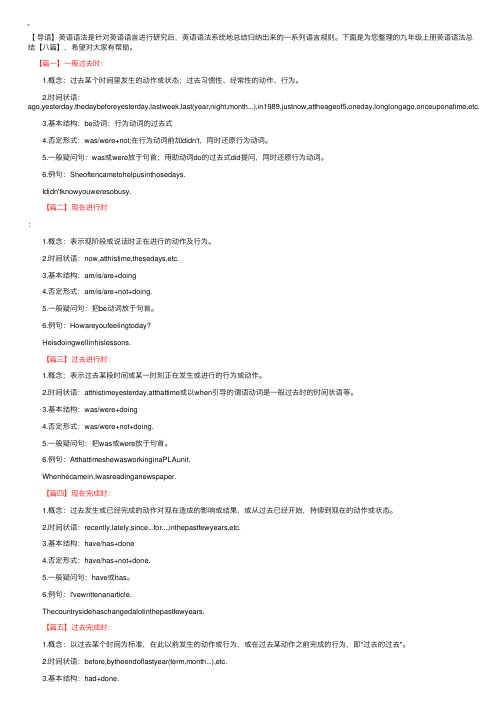
【导语】英语语法是针对英语语⾔进⾏研究后,英语语法系统地总结归纳出来的⼀系列语⾔规则。
下⾯是为您整理的九年级上册英语语法总结【⼋篇】,希望对⼤家有帮助。
【篇⼀】⼀般过去时: 1.概念:过去某个时间⾥发⽣的动作或状态;过去习惯性、经常性的动作、⾏为。
2.时间状语:ago,yesterday,thedaybeforeyesterday,lastweek,last(year,night,month...),in1989,justnow,attheageof5,oneday,longlongago,onceuponatime,etc. 3.基本结构:be动词;⾏为动词的过去式 4.否定形式:was/were+not;在⾏为动词前加didn't,同时还原⾏为动词。
5.⼀般疑问句:was或were放于句⾸;⽤助动词do的过去式did提问,同时还原⾏为动词。
6.例句:Sheoftencametohelpusinthosedays. Ididn'tknowyouweresobusy. 【篇⼆】现在进⾏时: 1.概念:表⽰现阶段或说话时正在进⾏的动作及⾏为。
2.时间状语:now,atthistime,thesedays,etc. 3.基本结构:am/is/are+doing 4.否定形式:am/is/are+not+doing. 5.⼀般疑问句:把be动词放于句⾸。
6.例句:Howareyoufeelingtoday? Heisdoingwellinhislessons. 【篇三】过去进⾏时: 1.概念:表⽰过去某段时间或某⼀时刻正在发⽣或进⾏的⾏为或动作。
2.时间状语:atthistimeyesterday,atthattime或以when引导的谓语动词是⼀般过去时的时间状语等。
3.基本结构:was/were+doing 4.否定形式:was/were+not+doing. 5.⼀般疑问句:把was或were放于句⾸。
九年级英语第一学期期中专项复习——词汇+语法(含答案)
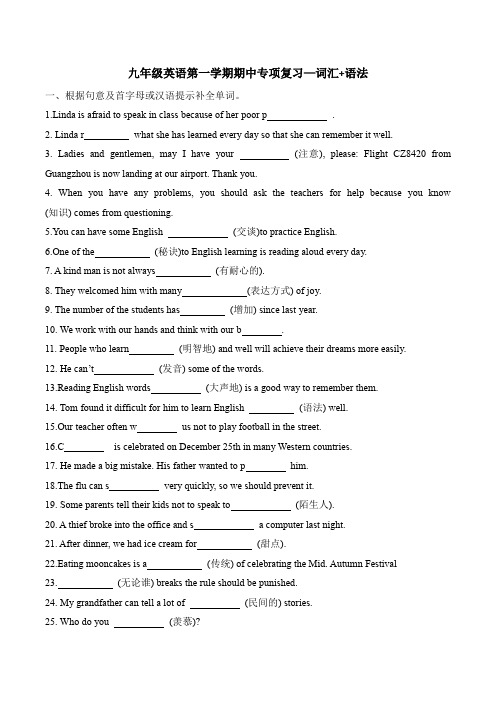
九年级英语第一学期期中专项复习—词汇+语法一、根据句意及首字母或汉语提示补全单词。
1.Linda is afraid to speak in class because of her poor p .2. Linda r what she has learned every day so that she can remember it well.3. Ladies and gentlemen, may I have your (注意), please: Flight CZ8420 from Guangzhou is now landing at our airport. Thank you.4. When you have any problems, you should ask the teachers for help because you know (知识) comes from questioning.5.You can have some English (交谈)to practice English.6.One of the (秘诀)to English learning is reading aloud every day.7. A kind man is not always (有耐心的).8. They welcomed him with many (表达方式) of joy.9. The number of the students has (增加) since last year.10. We work with our hands and think with our b.11. People who learn (明智地) and well will achieve their dreams more easily.12. He can’t (发音) some of the words.13.Reading English words (大声地) is a good way to remember them.14. Tom found it difficult for him to learn English (语法) well.15.Our teacher often w us not to play football in the street.16.C is celebrated on December 25th in many Western countries.17. He made a big mistake. His father wanted to p him.18.The flu can s very quickly, so we should prevent it.19. Some parents tell their kids not to speak to (陌生人).20. A thief broke into the office and s a computer last night.21. After dinner, we had ice cream for (甜点).22.Eating mooncakes is a (传统) of celebrating the Mid. Autumn Festival23. (无论谁) breaks the rule should be punished.24. My grandfather can tell a lot of (民间的) stories.25. Who do you (羡慕)?26. In China, we n (通常) say toilet or “washroom” in English.27. Our teacher is kind to us. He often gives us s on our study.28. I’d like some (新鲜的) vegetables.29. He asked several (职员) if there was a band. They all said no.30. On Monday morning, there are few people in the mall. It’s u .31. When you visit a foreign country, it is important to know how to ask for help p .32. It is i to ask the age of a woman in western countries.33. The r was directly refused. He must be very disappointed (失望的).34. I live right next to a supermarket. It's really (便利的).35. Would you please tell me your (地址) and telephone number?36. It was nearly 8: 00 o'clock. He (急促) to school without breakfast.37. What parents say and do will i their children.38. I don't think you will f the exam because you work so hard these days.39. That is (确切地) what I want to know.40. This book is (有帮助的) to make a decision for you.41. Miss Li is a today and I will give you a lesson.42. The man made the (介绍)and everyone shook hands with him.43. Can you tell us about her family (背景)?44. The reporter is (采访) our math teacher in the office.45. Some (门卫) are standing at the door at the moment.46. We saw some (非洲的) lions in the zoo last month.47. Tom is a (有幽默感的)boy.48. We should keep (沉默的)in in the library.49. Miss Wang is very (严肃的) in class.50.Tea plants are (广泛地) grown in the south of China now.51. The Internet has become part of (日常的)life.52. Every driver must obey the (交通) rules.53.When talking to British people,we should (避免) subjects like age,weight or money.54.The man put an advertisement in the (当地的) paper to sell his car.55. One Belt,One Road(一带一路)is helpful for the development of the (国际的) trade.56. The company (生产) many computers every day.57. My father gave me a (可移动的) phone as my birthday gift yesterday.58. The National Day (庆祝) this year was a great occasion.59. Diana is a writer of (历史的) novel.60. Mario is bright, (活泼的) and cheerful二、单项选择。
初三上册英语期中知识点

初三上册英语期中知识点1.初三上册英语期中知识点现在完成时:1.概念:过去发生或已经完成的动作对现在造成的影响或结果,或从过去已经开始,持续到现在的动作或状态。
2.时间状语:recently, lately, since...for...,in the past few years, etc.3.基本结构:have/has + done4.否定形式:have/has + not +done.5.一般疑问句:have或has。
6.例句:I've written an article.The countryside has changed a lot in the past few years.2.初三上册英语期中知识点可数名词变复数的几种形式1.单数名词加s: students, apples, bags, trees, books, brothers.2.以s、x、sh、ch结尾的名词加es: glasses, boxes, brushes, matches.3.以辅音字母加y结尾的名词,变y为i加es: cities, babies, enemies.4.以f或fe结尾的名词,多数变f为v加es: wives, knives.但有些词只加s: roofs,proofs, chiefs.5.以o结尾的名词,有些加es: Negroes, heroes, tomatoes, potatoes. 其它加s: radio s, zoos, pianos, photos.6.不规则名词:foot→feet, goose→geese, tooth→teeth, child→children, man→men, woman→women, mouse→mice.7.单复数同形的名词:sheep,fish,dee.注意:fish表示种类时,也用fishes这样的形式。
3.初三上册英语期中知识点从句1.宾语从句在复合句中,由一个句子充当宾语,这个句子叫做宾语从句。
人教版九年级英语期中复习知识点归纳总结(Unit1-6)
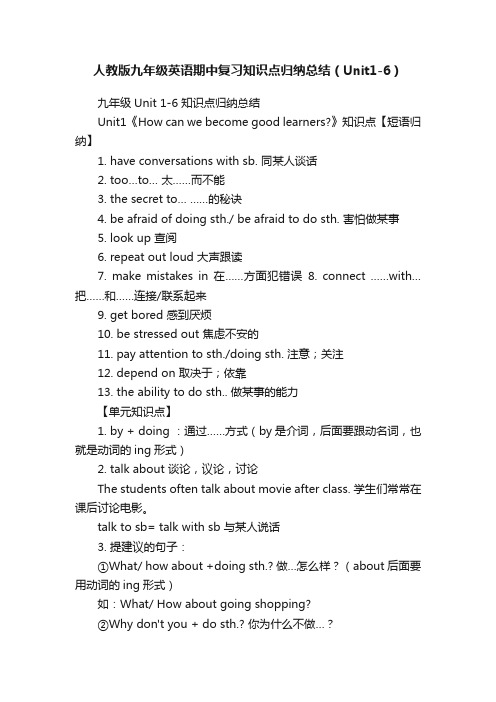
人教版九年级英语期中复习知识点归纳总结(Unit1-6)九年级Unit 1-6 知识点归纳总结Unit1《How can we become good learners?》知识点【短语归纳】1. have conversations with sb. 同某人谈话2. too…to… 太……而不能3. the secret to… ……的秘诀4. be afraid of doing sth./ be afraid to do sth. 害怕做某事5. look up 查阅6. repeat out loud 大声跟读7. make mistakes in 在……方面犯错误8. connect ……with… 把……和……连接/联系起来9. get bored 感到厌烦10. be stressed out 焦虑不安的11. pay attention to sth./doing sth. 注意;关注12. depend on 取决于;依靠13. the ability to do sth.. 做某事的能力【单元知识点】1. by + doing :通过……方式(by是介词,后面要跟动名词,也就是动词的ing形式)2. talk about 谈论,议论,讨论The students often talk about movie after class. 学生们常常在课后讨论电影。
talk to sb= talk with sb 与某人说话3. 提建议的句子:①What/ how about +doing sth.? 做…怎么样?(about后面要用动词的ing形式)如:What/ How about going shopping?②Why don't you + do sth.? 你为什么不做…?如:Why don't you go shopping?③Why not + do sth. ? 为什么不做…?如:Why not go shopping?④Let's + do sth. 让我们做…吧。
九年级英语期中知识点总结

九年级英语期中知识点总结英语是一门重要的国际通用语言,对于九年级的学生来说,掌握好英语的基础知识点和语法规则是非常重要的。
本文将对九年级英语期中知识点进行总结,帮助同学们更好地复习和备考。
一、词汇与短语1. 动词时态:一般现在时、一般过去时、现在进行时、过去进行时、一般将来时等。
例句:He usually goes to school by bus.(他通常乘公共汽车上学。
)Yesterday, I watched a movie with my friends.(昨天,我和我的朋友们一起看了一场电影。
)2. 名词与代词:可数名词、不可数名词、人称代词、物主代词等。
例句:I have two dogs.(我有两只狗。
)Can you lend me your pen?(你能借给我你的钢笔吗?)3. 形容词与副词:形容词的比较级和最高级、副词的用法和位置等。
例句:She is taller than her sister.(她比她的妹妹高。
)He speaks English fluently.(他流利地说英语。
)4. 冠词与介词:定冠词、不定冠词、介词的基本用法和搭配等。
例句:I want to buy a book.(我想买一本书。
)He lives in a small house.(他住在一栋小房子里。
)5. 重要短语:与学习、生活、旅行等相关的常用短语。
例句:I'm looking forward to seeing you.(我期待着见到你。
) Could you please tell me the way to the train station?(你能告诉我去火车站的路吗?)二、语法与句型1. 句子基本结构:主语、谓语、宾语、定语、状语等的基本概念和用法。
例句:She is reading a book in the library.(她正在图书馆看书。
) My father bought a new car last week.(我爸爸上周买了一辆新车。
九年级英语上册期中知识点

九年级英语上册期中知识点一、动词时态在英语中,动词的时态非常重要,能够准确地使用各种时态,是学习和掌握英语的基础。
下面是九年级英语上册中常见的动词时态:1. 一般现在时:表示经常性、习惯性的动作或状态。
例句:I usually go to school by bus.2. 一般过去时:表示过去发生的动作或状态。
例句:She played basketball with her friends yesterday.3. 一般将来时:表示将来要发生的动作或状态。
例句:We will have a party next week.4. 现在进行时:表示现在正在进行的动作。
例句:They are watching a movie at the moment.5. 过去进行时:表示过去某个时间段内正在进行的动作。
例句:He was reading a book when I saw him.6. 完成时态:包括过去完成时、现在完成时和将来完成时,用来表示某个时间之前已经完成的动作或状态。
例句:She had finished her homework before dinner.二、词汇题九年级上册的英语词汇非常丰富,掌握好词汇是理解和运用语言的基础。
以下是一些常见的词汇题类型:1. 同义词辨析:给出几个词,选出与给定词义相近或相似的词。
例题:Choose the synonym of "happy".A) sad B) excited C) angry D) tired答案:B) excited2. 反义词辨析:给出几个词,选出与给定词义相反的词。
例题:Choose the antonym of "big".A) small B) tall C) long D) short答案:A) small3. 词组搭配:给出几个词,选出与给定词搭配最合适的词组。
例题:Choose the correct phrase to complete the sentence: "He __________ his homework every day."A) does B) makes C) plays D) eats答案:A) does三、语法除了动词时态和词汇,九年级英语上册还涉及到一些基础的语法知识。
英语九年级期中知识点归纳
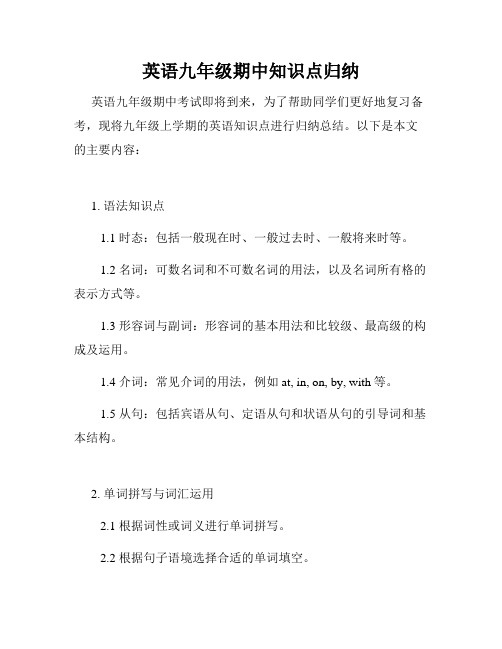
英语九年级期中知识点归纳英语九年级期中考试即将到来,为了帮助同学们更好地复习备考,现将九年级上学期的英语知识点进行归纳总结。
以下是本文的主要内容:1. 语法知识点1.1 时态:包括一般现在时、一般过去时、一般将来时等。
1.2 名词:可数名词和不可数名词的用法,以及名词所有格的表示方式等。
1.3 形容词与副词:形容词的基本用法和比较级、最高级的构成及运用。
1.4 介词:常见介词的用法,例如 at, in, on, by, with等。
1.5 从句:包括宾语从句、定语从句和状语从句的引导词和基本结构。
2. 单词拼写与词汇运用2.1 根据词性或词义进行单词拼写。
2.2 根据句子语境选择合适的单词填空。
2.3 根据图片或提示描述用所学单词造句。
3. 阅读理解与写作3.1 阅读理解:熟悉不同类型的阅读理解题目,如短文填空、选择题、判断题等。
3.2 写作:学习书写各类文章,如记叙文、说明文、议论文等,注重结构的合理安排和语言表达的流畅。
4. 听力技巧4.1 听懂并理解日常生活对话和广播播音的主要内容。
4.2 根据听到的内容完成相关任务,如填写表格、选择正确答案等。
5. 口语交际5.1 学习运用日常交际用语,如问候、介绍和请求等。
5.2 学会用简单句型进行日常对话的表达。
以上就是英语九年级期中考试的主要知识点的归纳总结。
同学们在备考期间要重点关注这些知识点的复习,多进行相关习题的训练,并在学习过程中培养良好的语言运用习惯和阅读习惯。
同时,注重听力和口语的训练,提高语言的听说能力,以便更好地应对考试和实际应用。
希望同学们能够充分利用这次期中考试的复习机会,全面提升自己的英语水平,取得好成绩。
祝愿大家在考试中取得优异的成绩!加油!。
英语九年级上册期中知识点

英语九年级上册期中知识点I. 语法1. 一般现在时:表示经常性、习惯性或普遍真理的动作或状态。
例句:I usually go to the park on weekends.(我通常在周末去公园。
)2. 一般过去时:表示过去某个时间发生的动作或状态。
例句:We visited the museum yesterday.(我们昨天参观了博物馆。
)3. 一般将来时:表示将来某个时间将要发生的动作或状态。
例句:They will have a party next week.(他们下周要举办聚会。
)4. 现在进行时:表示现在正在进行的动作。
例句:She is reading a book at the moment.(她此刻正在读一本书。
)5. 过去进行时:表示过去某个时间正在进行的动作。
例句:He was watching TV when I called him.(当我给他打电话时,他正在看电视。
)6. 现在完成时:表示过去发生的动作对现在造成的影响或结果。
例句:She has already finished her homework.(她已经完成了她的作业。
)7. 过去完成时:表示过去的过去某个时间已经完成的动作。
例句:They had already left when I arrived.(当我到达时,他们已经离开了。
)8. 情态动词can表示能力,may表示允许,must表示必须,should表示应该。
例句:You can play the guitar very well.(你弹吉他弹得很好。
)II. 词汇1. 形容词和副词的比较级和最高级。
例句:She is taller than her sister.(她比她妹妹高。
)2. 表示数量的词汇,如some、any、few、little等。
例句:Do you have any brothers or sisters?(你有兄弟姐妹吗?)3. 动词短语,如look forward to、pay attention to、take care of 等。
新译林版英语九年级上册期中复习Units1--4单元重点短语、句型、语法归纳

新译林版英语九年级上册期中复习Units1--4单元重点短语、句型、语法归纳Mr. Sun九上Unit1 Know yourself一、词汇大集合单词1.influence vt.[考点点拨] influence意为“影响”,往往指对行为、性格和观点等产生间接的、较长时间的或潜移默化的影响。
如:What you read influences your thinking.你读的东西对你的思想有影响。
influence还可以用作名词.泛指影响时是不可数名词;特指某种影响时是可数名词。
如:Will you use your influence to get me a job?你愿意运用你的影响力替我找一份工作吗?Television has a strong influence on people.电视对人有很强的影响。
2.require vt.[考点点拨] require意为“需要,要求”,常用于以下结构:(1) require+名词或代词。
如:They required immediate payment.他们要求立即付款。
(2) require sth from/of sb.向某人要求某物。
如:We required an apology from/of him.我们要求他赔礼道歉。
(3) require sb. to do sth.要求某人做某事。
如:We required him to keep it a secret.我们要求他对这件事保密。
3.difficulty n.[考点点拨] difficulty意为“困难;费力”时,是不可数名词,既不能与不定冠词连用,也不能以复数形式出现。
其形容词为difficult,意为“困难的”。
have difficulty (in)doing sth.做某事有困难;have difficulty with sth.做某事困难。
如:I have great difficulty in finishing the work by myself.我独自完成这项工作有很大困难。
九年级上册期中英语语法知识点归纳总结
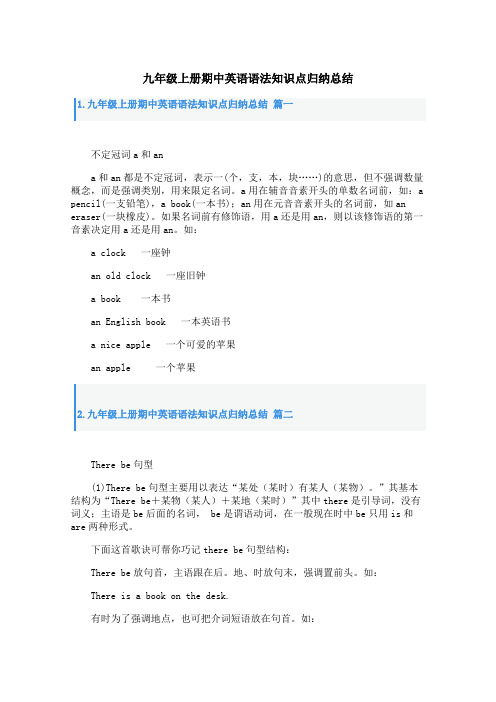
九年级上册期中英语语法知识点归纳总结1.九年级上册期中英语语法知识点归纳总结篇一不定冠词a和ana和an都是不定冠词,表示一(个,支,本,块……)的意思,但不强调数量概念,而是强调类别,用来限定名词。
a用在辅音音素开头的单数名词前,如:a pencil(一支铅笔),a book(一本书);an用在元音音素开头的名词前,如an eraser(一块橡皮)。
如果名词前有修饰语,用a还是用an,则以该修饰语的第一音素决定用a还是用an。
如:a clock 一座钟an old clock 一座旧钟a book 一本书an English book 一本英语书a nice apple 一个可爱的苹果an apple 一个苹果2.九年级上册期中英语语法知识点归纳总结篇二There be句型(1)There be句型主要用以表达“某处(某时)有某人(某物)。
”其基本结构为“There be+某物(某人)+某地(某时)”其中there是引导词,没有词义;主语是be后面的名词, be是谓语动词,在一般现在时中be只用is和are两种形式。
下面这首歌诀可帮你巧记there be句型结构:There be放句首,主语跟在后。
地、时放句末,强调置前头。
如:There is a book on the desk.有时为了强调地点,也可把介词短语放在句首。
如:On the desk there is a book.(2)There be句型中的be动词如何确定呢?请先看看下面这首歌诀:Be动词,有三个,am,is还有are。
“There be”真特别,不留am只留俩,那就是is还有are。
要用is还是are,须看其后的名词是单数还是复数。
若是单数或不可数名词用is,否则就用are。
如:①There is a tree behind the house.②There is some water(水)in the bottle(瓶子).③There are some pears in the box.(3)注意:如果“be”后的主语是由and连接的两个或两个以上的名词,那么be的形式要遵循“远亲不如近邻”的原则。
牛津译林版九年级上册英语期中复习9 A Unit 1-Unit 4 知识点总结!
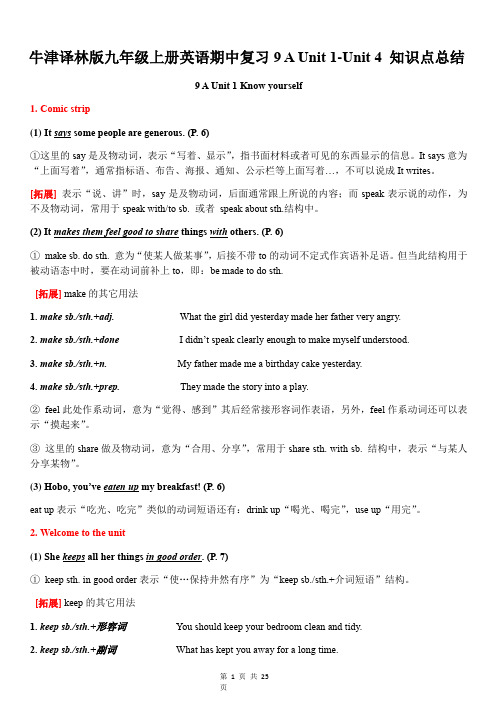
牛津译林版九年级上册英语期中复习9 A Unit 1-Unit 4 知识点总结9 A Unit 1 Know yourselfic strip(1)It says some people are generous. (P. 6)①这里的say是及物动词,表示“写着、显示”,指书面材料或者可见的东西显示的信息。
It says意为“上面写着”,通常指标语、布告、海报、通知、公示栏等上面写着…,不可以说成It writes。
[拓展] 表示“说、讲”时,say是及物动词,后面通常跟上所说的内容;而speak表示说的动作,为不及物动词,常用于speak with/to sb. 或者speak about sth.结构中。
(2) It makes them feel good to share things with others. (P. 6)①make sb. do sth. 意为“使某人做某事”,后接不带to的动词不定式作宾语补足语。
但当此结构用于被动语态中时,要在动词前补上to,即:be made to do sth.[拓展] make的其它用法1. make sb./sth.+adj. What the girl did yesterday made her father very angry.2. make sb./sth.+done I didn’t speak clearly enough to make myself understood.3. make sb./sth.+n. My father made me a birthday cake yesterday.4. make sb./sth.+prep. They made the story into a play.②feel此处作系动词,意为“觉得、感到”其后经常接形容词作表语,另外,feel作系动词还可以表示“摸起来”。
③这里的share做及物动词,意为“合用、分享”,常用于share sth. with sb. 结构中,表示“与某人分享某物”。
- 1、下载文档前请自行甄别文档内容的完整性,平台不提供额外的编辑、内容补充、找答案等附加服务。
- 2、"仅部分预览"的文档,不可在线预览部分如存在完整性等问题,可反馈申请退款(可完整预览的文档不适用该条件!)。
- 3、如文档侵犯您的权益,请联系客服反馈,我们会尽快为您处理(人工客服工作时间:9:00-18:30)。
初三上册期中英语语法归纳英语语法是针对英语语言进行研究后,英语语法系统地总结归纳出来的一系列语言规则。
英语语法的精髓在于掌握语言的使用。
以下是为您整理的初三上册期中英语语法归纳,供大家学习参考。
语法:直接引语变间接引语。
直接引用别人的话叫直接引语,用来转述别人的话叫间接引语。
例:Hesaid,”HewillgotoBeijingtomorrow.”HesaidthathewouldgotoBeijingthenextday.直接引语变间接引语时时态、人称及一些时间或个别词都要做相应的改变。
①时态:一般现在时→一般过去时一般将来时→过去将来时现在进行时→过去进行时一般过去时→过去完成时现在完成时→过去完成时*但真理性的句子时态不变。
例:Hesaid:”Thesunrisesintheeast.”Hesaidthatthesunrisesintheeast.他说太阳从东方升起。
②时间:now→then,lastmonth→themonthbefore.today→thatday,threedaysago→threedaysbefore.tonight→thatnight,tomorrow→thenextday.yesterday→thedaybefore,thedayaftertomorrow→intwodays.③其它变化:this→thatthese→thosehere→therecome→go句式的改变:①直接引语是陈述句加”that”可以省去。
例:Hesaid,”Mysisterwasherethreedaysago.”→Hesaidthathissisterhadbeentherethreedaysbefore.②直接引语是一般疑问句,变成用if/whether引导的宾语从句,人称时态等作相应改变。
Motheraskedme,”Didyoubuyanymeatforlunch?”→Motheraskedmeif/whetherIhadboughtsomemeatforlunch.③直接引语是特殊问句,变成由原来疑问词一样的连接词引导的宾语从句,时态人称等作相应改变。
例:“Whatdoyoudo?”heaskedme.HeaskedmewhatIdid.④直接引语是选择问句变成由whether或if引导的宾语从句。
“DoyoulikeEnglishorChinese?”Heaskedme.HeaskedmewhetherIlikedEnglishorChinese.语法:被动语态1.英语中动词有两种语态:主动语态和被动语态主动语态表示主语是谓语动词动作的执行者,被动语态表示主语是谓语动词动作的承受者。
当我们强调谁是某个动作的执行者,即”谁做了某种事情”时,用主动语态。
eg:Danielboughtanewcomputer丹尼尔买了一台新电脑。
如果主语不是动作的执行者,而是动作的承受者时,就是被动语态。
eg:AnewcomputerwasboughtbyDaniel一台新电脑被丹尼尔买了。
被动语态的谓语由be+动词的过去分词构成,其中be是助动词,随时态改变。
一般现在时的被动语态由”am/is/are+动词的过去分词”构成。
一般过去时的被动语态由”was/were+动词的过去分词”构成。
2.被动语态的用法:当不知道或没必要说明动作的执行者时,用被动语态。
eg:RiceisgrowninSouthChina.华南种植水稻。
Thisbridgewasbuilt100yearsago.这座桥是100年前建的。
Passivevoicewith’by’在被动语态中,如果我们也要把动作的执行者表达出来的话,我们就在被动句子的后面,用”by+动作的执行者”来表示。
e.g.Jackbrokethewindow.ThewindowwasbrokenbyJack.窗户是被杰克打碎的。
Mealsarecookedbyhermotherathome.在家饭是她母亲烧的。
Thebookwaswrittenbyhimseveralyearsago.这本书是他几年前写的。
3.难点:1).当一个含有复合宾语的句子变为被动语态时,只能把宾语变为被动语态的主语,宾补还放在原来的位置。
e.g.WecallhimXiaoWang.---HeiscalledXiaoWang.Hecuthishairshort.---Hishairwascutshort.2).带双宾语的动词变为被动语态时,常常把间接宾语变为被动语态的主语;如果直接宾语变为被动语态的主语时,间接宾语前要加介词to或for.e.g.Someonegavetheboyanapple.--Theboywasgivenanappl e.Anapplewasgiventotheboy.Hismotherboughtapresentforhim.---Hewasboughtapresen t.Apresentwasboughtforhim.3).在let,hear,watch,see,help,have等词的句子中,主动语态不加to,被动语态要加to.e.g.Thebossmakesuswork12hoursaday.---Wearemadetowor k12hoursaday.Theyheardthechildrensingthatmorning.---Thechildrenw ereheardtosingthatmorning.⑤直接引语是祈使句,根据说话语气变成ask/tell/orderwarnsb.todosth.的结构。
例:Shesaidtome,”Standup.”→Sheaskedmetostandup.Fathersaidtohisson,”Don’tplayfootballinthestreet.”→Fathertoldhissonnottoplayfootballinthestreet.语法:祈使句表示命令、叮嘱等的句子叫祈使句。
祈使句省略主语,以动词原形开头,常加please表示客气。
常有以下三种结构:行为动词开头。
例:Sitdown,please.(Pleasesitdown.)Comehere.Gothere.系词be开头。
Becareful!Besilent.Let开头。
例:Let’sdoitatonce.Lethimdoit.注:祈使句的否定式在句首加don’t。
例:Don’tspeakinChinese.别用汉语说。
Don’tbeheresoearly.别来这太早。
在祈使句前可以加never或always。
Neverclimbuptoohigh.It’sdangerous.Alwayscomeontime.总是准时。
Alwaysbepolitetoothers.总是对人礼貌。
语法:并列句由并列连词but,and,or,so,while等构成的并列句,例:HehelpsmeandIhelphim。
Hewasill,buthestillworkedon。
Helikescookingwhilehiswifelikestravelling。
语法:条件状语从句,以if引导。
if在英语中可以构成条件状语从句,意为“如果”,也可以构成宾语从句,意为“是否”。
例:Idon‘tknowifhewillcometomorrow。
我不知道他明天是否来。
Ifhecomes,I’llletyouknow。
如果他来,我让你知道。
*在if构成的条件状语从句中,如果主句是将来时,或祈使句或有情态动词,从句通常用一般现在时。
如上面的例句,再如:Hecanpasstheexamifhestudieshard。
如果他努力学习会通过考试的。
if构成的条件从句可以放于句子前面,也可以放于后面。
例:Ifitrains,Iwon‘tgowithyou。
如果下雨我就不和你去了。
Iwon’tgowithyouifitrains。
语法:比较级和最高级。
构成:单音节词和大部分双音节词变化词本身。
例:long→longer→longestbig→bigger→biggesteasy→easier→easiest多音节词在原形前+more和most,构成比较级、最高级。
例:beautiful→morebeautiful→mostbeautifulinteresting→moreinteresting→mostinteresting 特殊词:good/well→better→bestmuch/many→more→mostill/bad/badly→worse→worstlittle→less→least用法:两者比较用比较级,三者、三者以上用最高级。
例:Heistallerthanhisbrother。
他比哥哥高。
Heisthetallestinhisfamily。
他在家里最高。
△最高级要有比较范围,常用in或of短语表示。
例: Heisthefastestofthethree。
三个人中他最快。
